The infamous Friday spelling test. A staple in many classrooms and homeschool curricula alike. I can remember practicing my spelling words all week as a child. I even slept with my spelling list under my pillow once or twice, hoping that by osmosis, I’d remember the words better for the spelling test. {Yes. I really did.}
*This post contains affiliate links.
And I don’t remember that I aced a single spelling test. Quite the contrary. I struggled through them more than anything. But, I decided I was a bad speller based on my test scores. And so did my teacher. The opposite could also have been true. If I aced each test, I would have been deemed a good speller. And there are those kids who do. They are considered good spellers because of that perfect score on Friday’s spelling test. Then Monday comes…and the same word they aced on the test is misspelled in their writing.
Some of the questions that swirl around in my brain are:
- Did the child really learn how to spell each word?
- Do spelling tests really do any good at teaching kids how to spell?
- Just because a child can memorize and regurgitate information, does that mean they have learned it well?
And each time I ponder these questions, the answer I always come to is a clear “No.”
Why I Don’t Give a Friday Spelling Test
1. Getting 100% on a spelling test does not mean a child has mastery over those words. Most children, even those who earn that A+ on Friday’s test, will turn right around and misspell the same word in their writing {or spelling} time on Monday.
2. Just because a child can memorize words for a test does not mean he understands the logic or reasoning behind the spelling of words {Yes, the English language is logical}. Often times, spelling lists are a mixture of completely unrelated words {such as what, but, play, and like.} “Spelling lists don’t provide students with an understanding of why words are spelled certain ways, which would help students figure out how to spell the new words they encounter. And worse yet, lists can easily confuse the young spelling student, making the subject of spelling seem difficult and unlearnable” {All About Learning}.
3. Kids need multiple and meaningful exposure to concepts {including the spellings of words} for it to “stick”. Just one time through {like memorizing words for a spelling test} does not give them multiple {nor meaningful} exposure to the words. Most children need to read the words, write the words, and interact with the words through hands-on spelling activities to really know the word.
And What I do Instead
So, I don’t give a spelling test. Does this mean I don’t think spelling is important or that kids shouldn’t be held accountable for their spellings and misspellings? Absolutely not! Quite the contrary. Here are 8 ways I help my kids remember the spelling of words:
1. We study spelling patterns. Instead of focusing all our attention on random words, we group and study words by common patterns. So instead of an entire list of random words, our spelling list may look something like sit, wig, hip, and big. My two favorite spelling curricula that help kids see the common patterns words share are Words Their Way and All About Spelling. We use both in our home.
2. We study sight words. Each week, I do integrate sight words into our study. Sometimes the sight words fit the pattern. For example, in the word list from #1 above, big is a beginning high frequency or sight word, but it fits into the short i pattern. Sometimes the sight words do not fit. I look at Fry’s lists of sight words and the books they are reading that week to see which words my kids need as a part of their spelling words. You can read more about that here.
3. We have a “Word Study Notebook”. While interacting with the word patterns, my kids write {or glue} their words down in a word notebook. They may also record their sight words there. My kids can go back in their notebooks to look for spelling patterns to help them spell new words. You can see more about our Word Notebooks here.
4. We use a portable word bank {or word wall}. Once I have studied certain sight words, I jot them down in their portable word bank. This portable word wall can go with them when they are writing. If they don’t remember how to spell a word we have studied, they can look on their word bank (word wall) and find it.
5. We use an editing checklist. My Kindergartner has not been taught how to use this, yet {seeing that we’re only 6 days into the year}, but my 3rd grader is asked to edit his own work if he chooses to take it past the rough draft stage. He searches through his word notebook and portable word bank to correct his own misspellings. If there are other words that need correcting, I help him edit those; but he held accountable for what we have studied together. You can find our FREE editing checklist HERE.
6. I observe their spellings. I watch my kids as they write to see what words or word patterns they still don’t have under their belt. A child’s misspellings can give you just as much information about what they understand as their correct spellings. In my book, Teaching Kids to Spell, I spend some time showing you how to do this with your child’s writings/spellings.
If you are one to spell all unknown words to your child at the time of writing, take note of the kinds of words your child asks you to spell. Is there a common vowel pattern that always trips him up? Is there a common high frequency word {like because} that you may need to teach him? Observing your child is beneficial to you in so many ways and can help drive your spelling instruction.
7. We review words. Often times, I’ll notice my kids continuously misspelling a word we have studied. While planning their spelling activities, I incorporate that word again into their learning. Every 6-8 weeks, I plan a week of just review words, including the words that may still trip them up a bit based on my observations.
8. I give a Spelling Inventory. About every 9 weeks, I give a spelling inventory. This is different than a spelling test and can help to drive my spelling instruction based off of my kids’ misspellings.
So, in my home, you will not see a Friday spelling test. But, you WILL see my kids being held accountable for their learning of word spellings by their patterns and frequency.
More Spelling Resources:
Find over 700 pages of meaningful and FUN spelling activities and games in my ebook, Printable Spelling Activities & Games!
$20.00Add to cart
- Teaching Kids to Spell: A Developmental Approach to Spelling by Becky Spence
- 50 Hands-On Spelling Activities
- Helping Spellers Make Meaningful Phonics Generalizations
- Short Vowel Word Study App {COMING VERY SOON!} – a GREAT hands-on tool for teaching the patterns of short vowel words!
Follow This Reading Mama’s board Hands-On Spelling Ideas on Pinterest.
~Becky
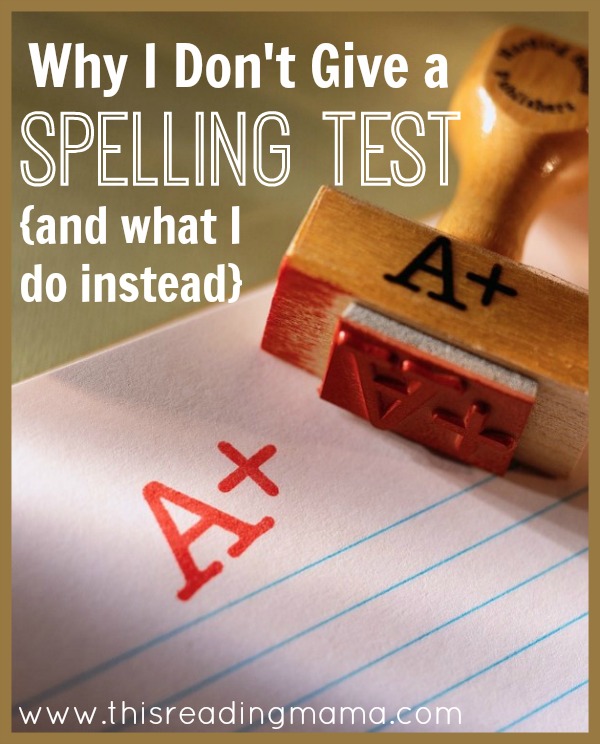


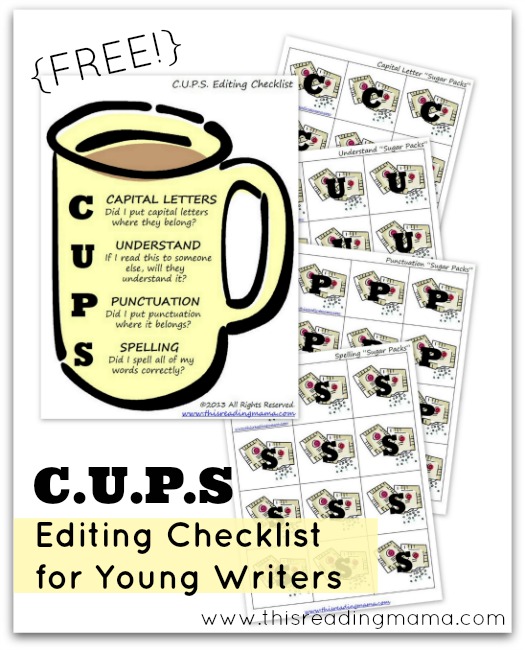
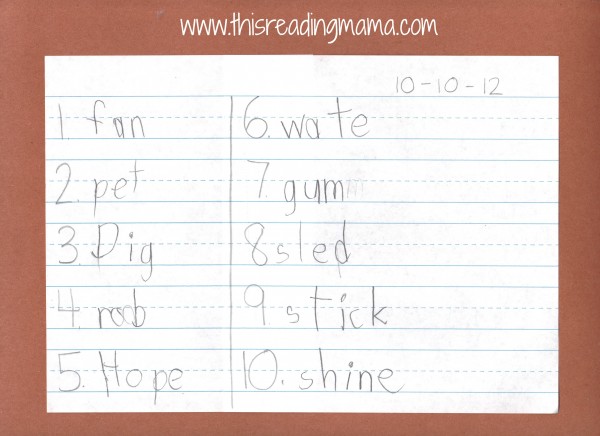
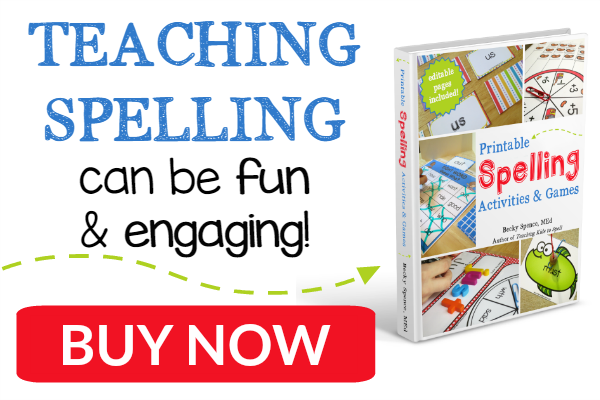
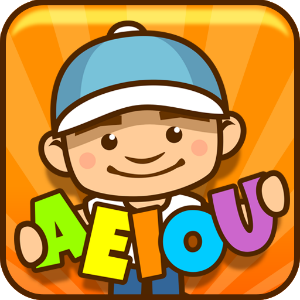
Thank you-this is helpful and has given me some useful ideas. My very weak speller finds spelling tests stressful to the extent that they haven’t been useful because they have caused so much anxiety. Patterns help and also, for her, kinaesthetic methods of learning such as skipping out the spelling and jumping onto paper with the correct letters. Her elder sister who also found spelling difficult used quite complex mnemonics which sometimes seemed more difficult to learn than the actual spelling.
My oldest doesn’t do well with tests either, so why cause unnecessary stress and anxiety? There are more effective ways to teach and practice spelling than a 1-time test. 🙂
I love these ideas and have long wondered about the true usefulness of a spelling test. I have also noticed that I have some kids that are just naturally good spellers and some that are not even though they are equally good readers. Great tips!
I love this! I was the kid in school who always aced the spelling test – but would be sick half the week with worry over it all the same. I love your approach to spelling – integrating it into various lessons and reviewing what the kids know that way.
Yes, I remember dreading Fridays as well. I didn’t want my kids to stress out over something I didn’t feel was absolutely necessary for spelling.
Having spent nine years as a professional editor, two as a freelance writer, and most recently three in marketing/copywriting position, my heart swells with joy to hear about your editing checklist! It is SUCH an important skill and so many kids are not taught early enough to be diligent in reviewing their writing. This post has SO MANY great tips, Becky. Thanks for sharing!!
Yes, I wanted to be sure my kids knew how to edit. It is SUCH an important skill! You’re welcome for sharing.
Thank you for the article and I agree with you. I am an Intervention Specialist and teach middle school (all subjects) and I agree that spelling tests does not mean mastery of words nor their understanding of them. I use making words activities with my students to get the to understand the logic that large words are composed of small words (most of the time). Hopefully this helps them when they are writing to help them remember how to spell words.
Oh, I love making words! What a fantastic activity to get kids to understand how words are spelled, especially longer words.
My son has just began kindergarten 1 month ago. But only officially doing lessons in class the past three weeks. His school is having the kinder kids do a spelling test every Friday. Which he has gotten a -7 out of 10 on all of them. My now 1st grade daughter did not have to do this when she was at the same school last yr for kinder. I feel it is very over whelming for them to have to do a test every week so soon. I can see them implementing spelling in grade-K three months in after they have fully established letter recognition thoroughly. He is so exhausted after he returns home everyday that he can’t even think let alone begin to study his words anymore than he did that day at school. We do read a lot and practice his sight words. But he knows them because of repetition not because he actually knows them. Does anyone else feel that kinder is really to soon to expect them to really be able to do a 10 word spelling test?
I would agree that 10 words is way too many! When I was a classroom teacher, we were pressured to give Kindergartners spelling tests, but I waited until after Christmas and I modified it for many of the students in my class.
I hated the spelling tests. I was horrible at it. I remember that all the kids who aced it got to play the game on the computer while the rest of us had to “relearn” the words. I am actually good at spelling, just not memorization. LOL. Had to spell that out. I’m glad you’re not doing the spelling and those are such interesting ideas. Thank you so much!
You say that you use Words Their Way and All About Spelling together? I am very interested in purchasing one. Do you like one over the other? My 3rd grade son has phonics background with reading, but we haven’t focused on any spelling test and now he needs more. My first grade daughter is in the phonics program, too. We used Hooked on Phonics to learn to read (that my not have been a good choice, but it’s all I knew when we picked it) and it tops out at second grade and I think my son needs to keep going. He really needs a spelling program. I like the two you have mentioned, but Words Their Way seems more complicated. Just thought I would see what you thought!
Words their Way is the one we use the most because I’m most familiar with it. If you’re looking for something that’s more step-by-step for you, I’d go with All About Spelling. 🙂
Thanks!
Thank you for this! I originally started off giving my second grader (now in third), weekly spelling tests. I saw her disappointment when she missed even one word. I eventually gave them up, but felt guilty doing so. I will be adding some of your ideas to what we are doing now. It’s nice to read validation regarding a course of action; esp. when I wasn’t sure I was doing the “right” thing.
I think you were wise mama to follow her lead! Yes, our kids need to be held accountable, but we can find more authentic ways that actually help spelling really “stick.”
Love your ideas. What can one do for older kids? I have a 4th and 5th grader and I am looking for ideas. Thank you!
Your post is so true. As a teacher, I have felt this way for years. I’ve used the Words Their Way Program many times and it works!
very nice to get your idea
Why not do all those things AND have a test at the end of the week? As a teacher too, I think that students need to know the spelling rules/patterns to be able to spell the words and should be able to use the word correctly both in written form and verbally. The goal is to increase vocabulary and be able to spell that vocabulary as well.
Great point! There’s nothing inherently wrong with a spelling test, so they don’t hurt students necessarily. My point was only that we shouldn’t rely so heavily on those scores to really understand what our students know/don’t know.
Love the C.U.P.S idea, thank you.
I’ve taught spelling in first grade for 26 years and incorporate all the suggestions you listed plus more and include a spelling check on Friday which is a few minutes out of the total spelling lesson time
given during the week. Maybe some people are overemphasizing the so called “test” portion of the week’s spelling instruction. It’s only one component of a spelling program.
Great points! Yes, I think some do overemphasize the test part. That was my reason for writing the post in the first place.
This is a fantastic list! Thank You, very informative article. Was looking for something like this. I help kids with their spelling homework all the time this list helps alot. Please share some more tips to decrease the spelling errors.
Year 8 spelling test online
I have found this article really interesting and completely agree with you on many points. As you said that getting 100% marks does not guarantee that the child knows everything as he might misspell the same word incorrectly. Thanks for sharing this article.
Nice Article!